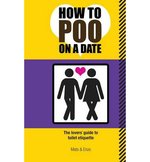Το πιο απολαυστικό κομμάτι στο καινούργιο ηλεδελτίο του Michael Quinion:
Thirty years ago, to assuage the boredom of the Frankfurt Book Fair, Bruce Robertson of the Diagram Group invented a contest to choose the oddest book title of the year. Ever since, it has been run by Horace Bent of The Bookseller. Some wonderful titles have been featured, including the first winner, “Proceedings of the Second International Workshop on Nude Mice”, and last year’s “If You Want Closure In Your Relationship, Start With Your Legs”. Others of note have been “Bombproof Your Horse”, “Highlights in the History of Concrete”, “The Joy of Sex: Pocket Edition”, “The Big Book of Lesbian Horse Stories”, and “Living With Crazy Buttocks”. Last autumn the best winner of the last 30 years was chosen: “Greek Rural Postmen and Their Cancellation Numbers” with the runners-up “People Who Don’t Know They’re Dead: How They Attach Themselves to Unsuspecting Bystanders and What to Do About It” and “How to Avoid Huge Ships”.
The shortlist is said to have been particularly difficult to create this year. It must have been, to exclude the title “Excrement in the Late Middle Ages”, which should have replaced “Techniques for Corrosion Monitoring”, an utterly mundane and sensible title. The others on the list were “Curbside Consultation of the Colon”, “The Large Sieve and its Applications” (a mathematics treatise), “Baboon Metaphysics”, “Strip and Knit with Style”, and “The 2009-2014 World Outlook for 60-milligram Containers of Fromage Frais” (since the usual size is 60g, I’m betting that the market is as minuscule as the pots).
The winner was announced on Friday as the result of voting by the public. By a significant margin it was the last title. It turns out that it’s not a real book, being the product of a patented method of automatic production of print-on-demand works from databases. It won’t actually exist until a tragic soul desperate to learn about the subject forks out $795 for a copy. Professor Philip Parker, who invented the production method that avoids the tedious part of the publishing business called authorship (and, it seems, the bit that sanity-checks numbers), has some 200,000 titles on tap, including –or so Horace Bent swears– marketing advice for toilet brush makers thinking of emigrating to Kyrgyzstan.
Δεν θα ήταν δυνατό να λείπει το θέμα από την Wikipedia. Και εκεί θα βρούμε μια πληρέστερη κάλυψη καθώς και κάποιες λεπτομέρειες για το βιβλίο που μας έφερε στην κορυφή:The shortlist is said to have been particularly difficult to create this year. It must have been, to exclude the title “Excrement in the Late Middle Ages”, which should have replaced “Techniques for Corrosion Monitoring”, an utterly mundane and sensible title. The others on the list were “Curbside Consultation of the Colon”, “The Large Sieve and its Applications” (a mathematics treatise), “Baboon Metaphysics”, “Strip and Knit with Style”, and “The 2009-2014 World Outlook for 60-milligram Containers of Fromage Frais” (since the usual size is 60g, I’m betting that the market is as minuscule as the pots).
The winner was announced on Friday as the result of voting by the public. By a significant margin it was the last title. It turns out that it’s not a real book, being the product of a patented method of automatic production of print-on-demand works from databases. It won’t actually exist until a tragic soul desperate to learn about the subject forks out $795 for a copy. Professor Philip Parker, who invented the production method that avoids the tedious part of the publishing business called authorship (and, it seems, the bit that sanity-checks numbers), has some 200,000 titles on tap, including –or so Horace Bent swears– marketing advice for toilet brush makers thinking of emigrating to Kyrgyzstan.
The second "Diagram of Diagrams", announced on 5 September 2008, was Greek Rural Postmen and Their Cancellation Numbers, the 1996 winner. The book looks at the history of Greek stamps in rural parts of the country and how they came to be cancelled by the Greek Postal Service. It is designed, "to encourage the collection of Greek stamps and to promote their study".











